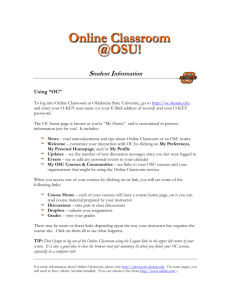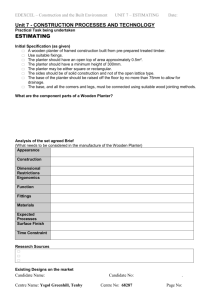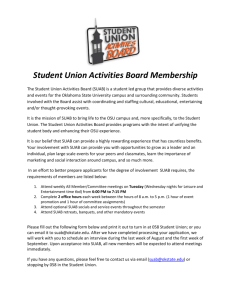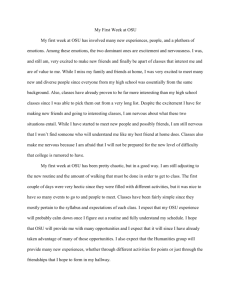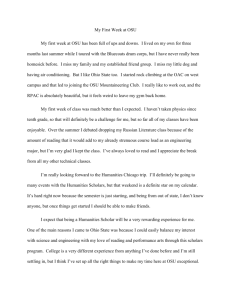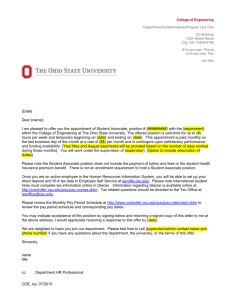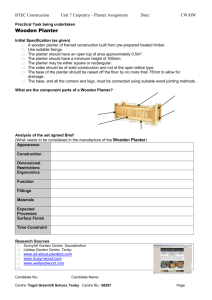Cowboy Technologies Board, 2014
advertisement
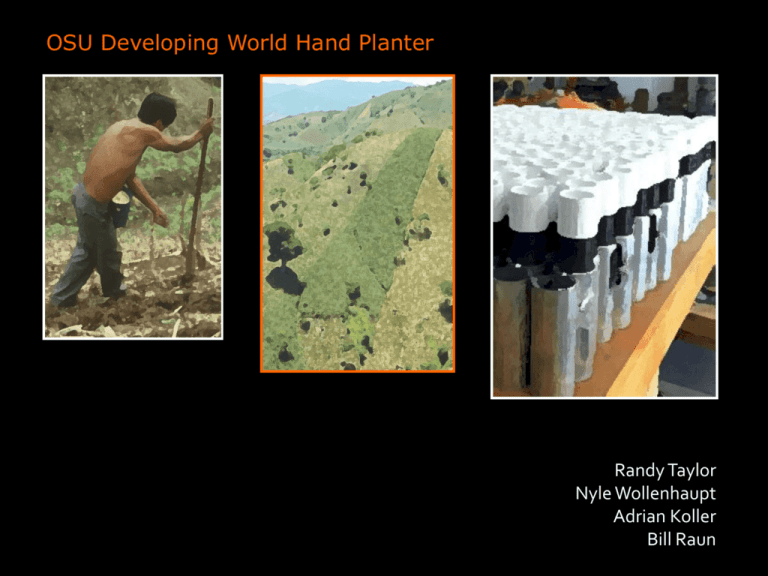
OSU Developing World Hand Planter Randy Taylor Nyle Wollenhaupt Adrian Koller Bill Raun david.waits@okstate.edu rgajan@okstate.edu amy.dronberger@okstate.edu May 28, 2014 Dr. David Waits (Chairman, Cowboy Technologies) Dr. Richard Gajan (School of Entrepreneurship) Dr. Amy Dronberger (Cowboy Technologies) OSU Hand Planter • works well over a range of seed sizes (1200 to 2000 seeds/lb) • 80,000,000 ac’s of corn planted, weeded, hoed, and harvested by hand • World area planted by hand = corn area in the USA • average farm sizes are 2 ac’s • NGO support, interaction, and ultimate subsidizing of this work is expected • January 2014, conducted an international hand planter workshop whereby on-line-internet attendees included locations in Africa, Asia, Latin America, and the USA http://nue.okstate.edu/Hand_Planter/osu_hand_planter_workshop.html EL SALVADOR ZIMBABWE HONDURAS UGANDA seed size (2653-4344 seeds/kg) seed type, shape fertilizer 1,000,000 cycles 0.29g/seed 60,000 seeds/ha 3443 seeds/kg 1.0 kg hopper 17 times refill http://nue.okstate.edu/Hand_Planter.htm Reciprocating Drum Action Drum rotates with the cavity moving back into the seed hopper as the spring is compressed. Spring is fully compressed and the singulation drum cavity is exposed to seed in the hopper Drum position when planter is relaxed. As the force on the spring is released, the singulation drum rotates back to the initial ‘relaxed’ position and the seed is dropped. El Salvador, Hand Planter Trials, June, 2014 INTERNAL DRUM Drum A Mass (g) 0.69 Volume (cm3) 0.507 B 0.71 0.521 OS 0.88 0.646 OM 3.36 2.468 OC 3.38 2.482 OSU Hand Planter Nov 13, 2013 100 SED = 8.6 Maize emergence, % 80 60 Doubles Singles 40 20 0 H1st 450s 3572 H1st 450s 3263 H1st 450s 2652 H1st 450b 3572 H1st 450b 3263 H1st 450b 2652 H1so 450s 3572 H1so 450s 3263 H1so 450s 2652 Housing, Brush, Drum, Seed Size H1so 450b 3572 H1so 450b 3263 H1so 450b 2652 check 3263 Options A. Retain venue where we can get planters into the hands of producers (independent of both smaller and/or large scale agreements with others). NGO model could end up being a very small facet of the big picture but still needed B. AGCO licenses planter through OSU. AGCO delivery to larger markets (gardeners, walmart, food-plot industry) would be entirely up to them What they call the planter, price, etc., would be under their control AGCO pays OSU a certain value per planter sold. TWR would negotiate with OSU so as to allow future research/ownership in the “technology.” If AGCO takes leadership, our agreement (OSU) would include a research/extension role. if AGCO wants to grant “exclusive” agreements with x-group for “Africa” that would be their decision. Keep us as consultants C. Indigdev as the Management Team. Joshua Ringer, respected with many good skills. Would need a written agreement Business model? Use TBDP $30,000 to refine the planter and if this all takes off, it will obviously benefit OSU Planning rkt Is Indigdev the management team? License technology to Indigdev Indigdev will have long term role in distribution and support for the planter Weaknesses: Limited business management skills. Would we invest in them independently? not Indigdev, then who? Can Cowboy Technologies provide a management team. This will cost us a share of any LLC that we form (negotiation with Cowboy Technoligies). TWR would be part owners and consultants to the LLC What is our business model? -get planters branded to reduce costs -primary brand for one fee and a secondary brand (approved by the primary brander) for reduced fee -planter is durable and only real parts to replace or exchange are the metering drum, spring, and tip -need local, in-country clearing house -we ship parts and they build custom planters -helps the local economy and creates ‘local ownership’ 1,000,000 cycles, no failures 1 hectare, 100,000 seeds/ha, 10 years OSU Hand Planter Thailand Mexico Zambia Regional Trials: El Salvador, Thailand, Colombia, Uganda, Zambia El Salvador Guatemala Grain production is vital because worldwide people get 48% of their calories from eating grain directly. As incomes rise, the percent drops dramatically as diets change to include more meat, milk, eggs and other foods that require more grain to produce. About 48% of grains are eaten directly, 35% fed to animals, and 17% for ethanol and other fuels. Worldwatch Institute • Bangladesh • Burundi • Belize • Brazil • Colombia • El Salvador • Ethiopia http://nue.okstate.edu/Hand_Planter/ osu_hand_planter_workshop.html • Guatemala • India • Kenya • Malawi • Mexico • Mozambique • Sierra Leone • Nepal • Philippines • Tanzania • Togo • Uganda • USA • Zambia • Zimbabwe Technology to be commercialized (OSU Hand Planter) • Remove chemically treated seed from the hands of producers • Decrease soil erosion via improved plant spacing • Accommodate mid-season application of urea-N • Place urea below the surface reducing NH 3 losses • Increase corn production and NUE GUATEMALA
